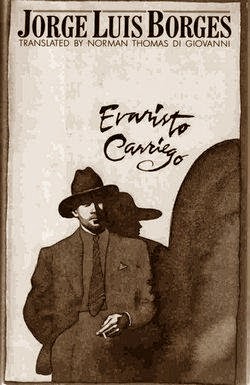En un cajón hay un puñal.
Fue forjado en Toledo, a fines del siglo pasado; Luis Melián Lafinur se lo dio a mi padre, que lo trajo del Uruguay; Evaristo Carriego lo tuvo alguna vez en la mano.
Quienes lo ven tienen que jugar un rato con él; se advierte que hace mucho que lo buscaban; la mano se apresura a apretar la empuñadura que la espera; la hoja obediente y poderosa juega con precisión en la vaina.
Otra cosa quiere el puñal.
Es más que una estructura hecha de metales; los hombres lo pensaron y lo formaron para un fin muy preciso; es, de algún modo, eterno, el puñal que anoche mató a un hombre en Tacuarembó y los puñales que mataron a César. Quiere matar, quiere derramar brusca sangre.
En un cajón del escritorio, entre borradores y cartas, interminablemente sueña el puñal su sencillo sueño de tigre, y la mano se anima cuando lo rige porque el metal se anima, el metal que presiente en cada contacto al homicida para quien lo crearon los hombres.
A veces me da lástima. Tanta dureza, tanta fe, tan impasible o inocente soberbia, y los años pasan, inútiles.
The Dagger
To Margarita Bunge
A dagger rests in a drawer.
It was forged in Toledo at the end of the last century.
Luis Melián Lafinur gave it to my father, who
brought it from Uruguay. Evaristo Carriego once
held it in his hand.
Whoever lays eyes on it has to pick up the dagger
and toy with it, as if he had always been on the
lookout for it. The hand is quick to grip the waiting
hilt, and the powerful obeying blade slides in and out
of the sheath with a click.
This is not what the dagger wants.
It is more than a structure of metal; men conceived
it and shaped it with a single end in mind. It
is, in some eternal way, the dagger that last night
knifed a man in Tacuarembó and the daggers that
rained on Caesar. It wants to kill, it wants to shed
sudden blood.
In a drawer of my writing table, among draft
pages and old letters, the dagger dreams over and
over its simple tiger’s dream. On wielding it the
hand comes alive because the metal comes alive,
sensing itself, each time handled, in touch with the
killer for whom it was forged.
At times I am sorry for it. Such power and single-
mindedness, so impassive or innocent its pride,
and the years slip by, unheeding.
En Evaristo Carriego
Buenos Aires, 1930
 |
| Margarita Bunge de Bunge Campos Urquiza, a quien JLB dedica el poema, en publicidad gráfica de Cremas Ponds |
 |
| Cover versión inglesa |
Versión en inglés: Translated with Introduction and Notes
© 1982, 1984
by Norman Thomas di Giovanni
with the assistance of Susan Ashe
E. P. Dutton, Inc. New York
